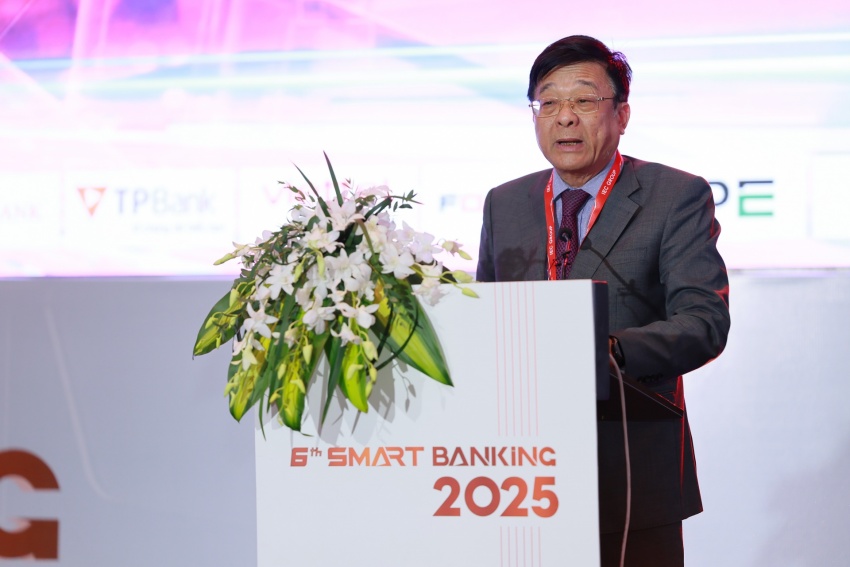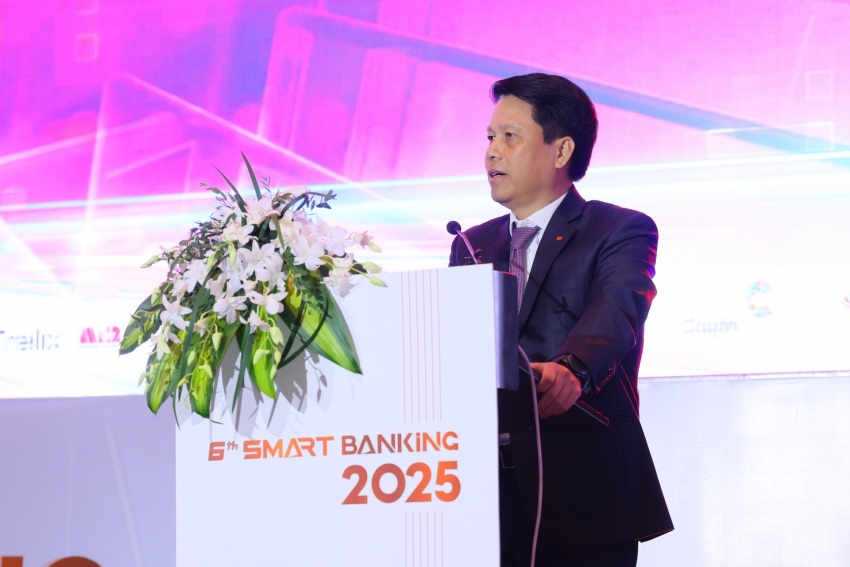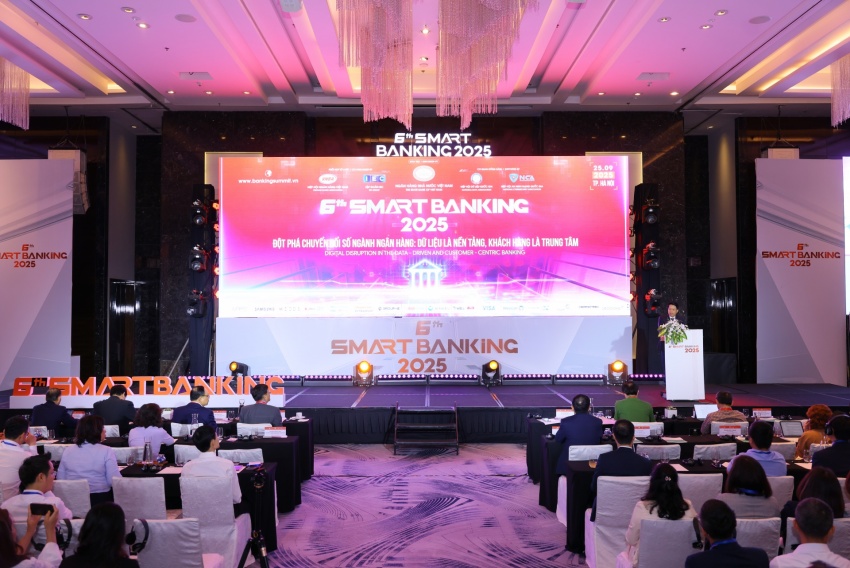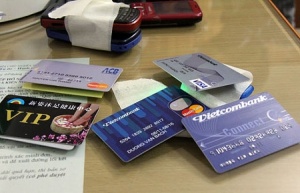INTERNATIONAL INVESTMENT
AND PORTAL
On September 25 in Hanoi, Smart Banking 2025 took place under the theme “Digital disruption in data-driven and customer-centric banking”.
The event was held under the auspices of the State Bank of Vietnam (SBV), organised by the Vietnam Banks Association (VNBA) in cooperation with IEC Group, and supported by the National Data Association and the National Cybersecurity Association.
In his opening remarks, Dr. Nguyen Quoc Hung, vice chairman cum secretary-general of VNBA, noted that many credit institutions have shifted from digitising individual processes to redesigning the entire customer journey.
“They have moved from fragmented data ownership to managing data as a strategic asset, and from reactive responses to predictive, proactive engagement with customer needs,” he added.
Although cashless payments have achieved remarkable progress, Dr. Hung candidly stressed that to achieve real breakthroughs in 2025 and beyond, multiple intertwined challenges must be addressed simultaneously.
"First is standardising and cleansing data at the system-wide level, and developing unified data architecture instead of layering fragmented solutions. Next is establishing a consistent framework for data governance, security, privacy, and ethics in data use. At the same time, we must strengthen controlled data interoperability between banks and identity platforms, population and business databases, e-commerce, insurance, and telecommunications," he added.
 Dr. Nguyen Quoc Hung, vice chairman cum secretary-general of VNBA
Dr. Nguyen Quoc Hung, vice chairman cum secretary-general of VNBA
In parallel, he called for enhancing real-time analytics capacity to support instant decision-making in credit approval, operational risk management, and fraud monitoring.
According to Hung, above all, the guiding principle must remain unchanged: customers are at the centre of value, experience, safety, and trust, not merely in slogans.
“To provide highly technological, personalised banking products and services that elevate customer experience, data collection, utilisation, and processing must always be prioritised,” said Hung.
At the conference, Pham Tien Dung, Deputy Governor of the SBV, highlighted that 98 per cent of customers now transact through digital channels.
“The SBV is building a legal framework to enable banks to develop standardised products and services aligned with international best practices,” informed Dung.
According to him, this provides a vital foundation for the banking sector to expand into the digital space while promoting financial inclusion.
“The boom of the digital financial ecosystem has made banking product and service development faster, more convenient, safer, and more secure,” he said. “In just one day, the banking system recorded more than 30 million transactions with a total value of $40 billion through inter-branch transfers. This is an exceptionally large figure.”
The SBV's deputy governor emphasised that data and customers are two separate yet inseparable elements. Without customers, there is no data, and data that is not exploited holds no value. This, he said, is the core story of banking.
"Data is the foundation, a valuable resource. However, customers remain the centre. Therefore, in the digital era, the banking sector must meet three criteria: deliver smart and convenient applications, support customers effectively, and protect their legitimate rights and interests," said Dung.
 Pham Tien Dung, Deputy Governor of the State Bank of Vietnam
Pham Tien Dung, Deputy Governor of the State Bank of Vietnam
Alongside government policies, banks themselves must also place data at the core of their operations.
Major General Nguyen Ngoc Cuong, director of the National Data Centre under the Ministry of Public Security, cum vice president of the National Data Association, argued that a smart bank must first be a data-driven bank.
“Leading banks worldwide now view themselves as data companies. They invest heavily in data warehouses, AI analytics platforms, and data scientists to unlock the gold mine of data they possess,” he stressed.
In Vietnam, Cuong acknowledged that many banks have pioneered data-driven services. However, he also frankly pointed out the challenges in banking data exploitation and governance.
"Data cleansing, standardisation, and synchronisation across banks and with national databases have not been carried out continuously. Data connectivity and sharing, although progressing, such as integration with the population database, remains limited, as financial-banking data structures are not yet fully interoperable with other sectors. Most banks still use data only for internal purposes," noted Cuong.
"Data enrichment and external data sharing through models such as open banking or financial data warehouses have not been conducted regularly. This hinders the creation of new services, not only in fintech but across other industries as well," he added.
 Overview of Smart Banking 2025
Overview of Smart Banking 2025
Pham Anh Tuan, director of the SBV's payment department, informed the event that the SBV has issued a series of circulars, including seven in 2024 alone, covering payments, accounts, cards, and e-wallets.
“The SBV is deeply concerned about fraud and scams. Therefore, regulations require service providers to implement processes for prevention, deterrence, and customer warnings against fraud,” he said.
According to Tuan, about ten criteria are used to identify suspected accounts of fraud. Based on these criteria, institutions compile lists and submit them to the SBV.
“The SBV has collected around 600,000 accounts linked to such activities. Through pilot implementation with banks, as of early September, nearly 300,000 customers have been warned to stop transactions, preventing losses of about $60 million,” he added. “With this new tool, we believe that when customers transfer money and receive an alert, they will consider whether to proceed.”
Tuan also noted that after personal accounts involved in fraud were blocked, offenders have shifted to using organisational accounts. The SBV is therefore revising related regulations to ensure security and prevent such activities.
"In October, at least two revised circulars will be issued. One will amend Circular 48 on cards, granting card issuers greater autonomy while also imposing stricter responsibilities on issuing and acquiring institutions. The other will amend Circular 40 on e-wallets, which is currently under evaluation and expected to be signed and come into force within a week," he said.
“These new regulations will enhance security and safety for payment instruments, especially cards and e-wallets,” Tuan stressed.
 SBV steps up efforts to clean up bank accounts and boost digital banking
SBV steps up efforts to clean up bank accounts and boost digital banking
Vietnam's banking sector is intensifying its crackdown on fraud, dormant, and unverifiable accounts through stricter regulations and biometric authentication in an effort to enhance data transparency and accelerate digital transformation.
 Australia and Vietnam join forces to boost financial and digital innovation
Australia and Vietnam join forces to boost financial and digital innovation
The Australian Trade and Investment Commission (Austrade) signed an MoU with the Vietnam Banks Association (VNBA) on June 2, marking a significant step forward in enriching fintech collaboration between the two countries.
 VPBank pioneers next-gen digital core banking with OneConnect
VPBank pioneers next-gen digital core banking with OneConnect
VPBank has taken a major step in digital transformation by partnering with fintech leader OneConnect to develop Vietnam's first next-generation digital core banking system.



















